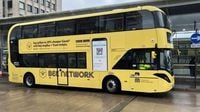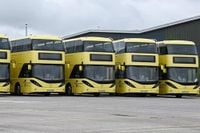Greater Manchester is bracing for a wave of travel chaos later this month as more than 2,000 bus drivers prepare to walk out in a four-day strike over pay, threatening to bring much of the region’s public transport to a grinding halt. The industrial action, announced by the Unite union on September 5, 2025, is set to take place from September 19 to September 22, and will hit the Bee Network—a recently introduced franchising system that has become the backbone of Manchester’s public transit—particularly hard.
The strike will involve drivers from three major operators: Stagecoach, Metroline Manchester, and First Bus Rochdale. According to BBC News, approximately 1,000 drivers at Stagecoach depots in Oldham, Stockport, and Middleton, as well as another 1,000 Metroline Manchester workers based at Sharston, Hyde Road, Ashton, and Wythenshawe, have rejected pay increase offers of 3.5%. Meanwhile, 110 First Bus Rochdale staff turned down a 6% pay rise, with the union arguing it still leaves them as the lowest paid in the region, earning £15 an hour.
Unite’s leadership has been unequivocal in its support for the strike, citing years of stagnant wages and the ongoing cost-of-living crisis as the main drivers behind the action. As Unite General Secretary Sharon Graham put it, “Our members have agreed this is unacceptable and have unequivocally voted to strike. They have Unite’s full backing throughout the whole of this dispute.” The union’s regional officer, Colin Hayden, echoed her sentiments, warning that “with so many drivers across the Bee Network walking out at once, this will be a highly disruptive strike that will bring parts of Greater Manchester to a standstill.”
The timing of the strike could not be more disruptive. The four-day walkout coincides with several major events in Manchester, including the high-profile Manchester United vs Chelsea football match at Old Trafford on September 20, comedian Peter Kay’s performance at the AO Arena, and singer Tom Grennan’s concert at Coop Live, both on September 19. According to Manchester Evening News, these events are expected to draw tens of thousands of attendees, many of whom rely on the Bee Network for transportation. With widespread delays and cancellations looming, the impact on daily commuters and event-goers alike is likely to be significant.
For many drivers, the dispute is about more than just the numbers on their paychecks. Unite has repeatedly stressed that the 3.5% offer from Stagecoach and Metroline falls short, especially given that the latest UK inflation rate stands at 3.8%. As stated by union representatives and reported by BBC News, “the offer doesn’t address years of low pay, especially in the context of a cost-of-living crisis.” Similarly, First Bus Rochdale drivers rejected the 6% pay rise, arguing that it “does not go far enough to address the fact workers there have had years of being paid less than their counterparts at other companies and are the lowest paid in the region.”
The companies at the center of the dispute have pushed back, insisting that their offers are fair and that they remain committed to finding a solution. Matt Davies of Stagecoach told the BBC that the company “would continue to work towards a resolution and was preparing contingency plans if the drivers go ahead with ‘unnecessary strike action.’” Metroline, for its part, argued that its drivers “would have been the best paid outside London” had their offer been accepted, and said it is “extremely disappointed in Unite’s decision to announce strike action.” A spokesperson for Metroline Manchester added, “We value our drivers and have continuously engaged with Unite to work for a positive outcome. Had our pay offer been accepted, it would have ensured that our drivers continue to be amongst the best paid outside of London. We remain open and committed to finding a solution and we encourage Unite to engage in discussions to resolve this and avoid any disruption to commuters and communities across Greater Manchester.”
First Bus Rochdale has also expressed frustration at the prospect of industrial action. General manager Paul Townley told the Manchester Evening News, “We are disappointed in the decision of Unite to announce strike action. The management team at First Bus in Rochdale have been working hard to find solutions to help our valued drivers during these tough economic times. The pay offer we have made of six per cent is well above current inflation and will help manage the rising cost of living. The Rochdale team is ready and willing to continue discussions and we encourage Unite to join us so we can finalise a settlement. Industrial action is not the way forward and will be damaging to everyone, causing severe disruption to the daily lives of our customers who rely on the bus to get to work, education and for appointments.”
Despite the heated rhetoric on both sides, there remains a glimmer of hope for a resolution. Unite’s Colin Hayden emphasized, “Unite remains open to negotiations with the bus companies who need to return to the negotiating table with an improved offer.” The union has made it clear that it would consider suspending the strike if the operators present a more substantial pay deal. For now, however, the standoff continues, and the region is left to prepare for a tumultuous few days.
Transport for Greater Manchester, the body responsible for overseeing the city’s public transport, has sought to reassure the public, though its powers in the dispute are limited. A spokesperson told BBC News, “Bus operators are responsible for the pay and conditions of their staff, and the specifics of any talks is a matter for them and the relevant trade union. Our priority is to keep Greater Manchester moving and we are monitoring the situation closely.”
For residents, the looming strike is more than just an inconvenience; it’s a reminder of the delicate balance that keeps a city running. With so many people relying on buses to get to work, school, medical appointments, and major events, even a short disruption can ripple through daily life. As one union leader put it, “We know residents will be disappointed to hear of potential action, but this is entirely the fault of the employers involved. Our members feel they have no choice but to walk out to make their voices heard.”
With the September 19 start date fast approaching, all eyes are on the negotiating table. Whether the threat of widespread disruption will spur a last-minute agreement remains to be seen. For now, Manchester’s bus drivers—and the thousands who rely on them—are preparing for a pivotal showdown that could shape the future of public transit pay across the region.






